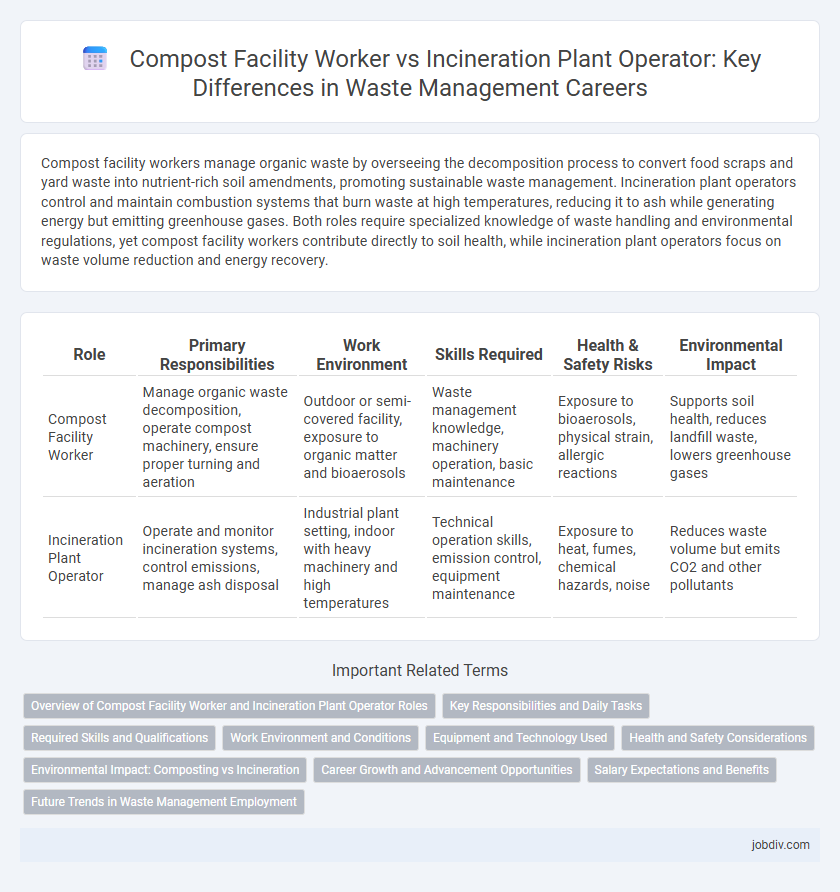Compost facility workers manage organic waste by overseeing the decomposition process to convert food scraps and yard waste into nutrient-rich soil amendments, promoting sustainable waste management. Incineration plant operators control and maintain combustion systems that burn waste at high temperatures, reducing it to ash while generating energy but emitting greenhouse gases. Both roles require specialized knowledge of waste handling and environmental regulations, yet compost facility workers contribute directly to soil health, while incineration plant operators focus on waste volume reduction and energy recovery.
Table of Comparison
| Role | Primary Responsibilities | Work Environment | Skills Required | Health & Safety Risks | Environmental Impact |
|---|---|---|---|---|---|
| Compost Facility Worker | Manage organic waste decomposition, operate compost machinery, ensure proper turning and aeration | Outdoor or semi-covered facility, exposure to organic matter and bioaerosols | Waste management knowledge, machinery operation, basic maintenance | Exposure to bioaerosols, physical strain, allergic reactions | Supports soil health, reduces landfill waste, lowers greenhouse gases |
| Incineration Plant Operator | Operate and monitor incineration systems, control emissions, manage ash disposal | Industrial plant setting, indoor with heavy machinery and high temperatures | Technical operation skills, emission control, equipment maintenance | Exposure to heat, fumes, chemical hazards, noise | Reduces waste volume but emits CO2 and other pollutants |
Overview of Compost Facility Worker and Incineration Plant Operator Roles
Compost Facility Workers manage organic waste by overseeing the decomposition process, turning food scraps, yard waste, and other biodegradable materials into nutrient-rich compost for agricultural use. Incineration Plant Operators handle the combustion of non-recyclable waste, controlling machinery that converts refuse into energy while minimizing emissions. Both roles are crucial in waste management but focus on distinct processes: biological recycling through composting versus energy recovery via incineration.
Key Responsibilities and Daily Tasks
Compost Facility Workers manage organic waste by monitoring decomposition processes, turning organic material, and ensuring proper moisture and temperature levels to optimize compost quality. Incineration Plant Operators control and maintain waste combustion systems, monitor emissions to comply with environmental regulations, and operate machinery to safely convert waste into energy. Both roles require adherence to safety protocols and routine equipment inspections to maintain operational efficiency and environmental compliance.
Required Skills and Qualifications
Compost facility workers need knowledge of organic waste management, soil science, and composting processes, along with physical stamina and safety awareness to handle biodegradable materials effectively. Incineration plant operators require expertise in machinery operation, combustion control, and environmental regulations, coupled with technical skills in monitoring emissions and maintaining plant equipment. Both roles demand attention to detail, adherence to environmental standards, and ability to work within waste management protocols to ensure sustainable and compliant facility operation.
Work Environment and Conditions
Compost facility workers typically operate outdoors or in semi-enclosed environments, exposed to organic matter, varying weather, and physical labor involving sorting and turning compost piles. Incineration plant operators work indoors in industrial settings with high-temperature equipment, controlling waste combustion processes while managing air quality controls and safety protocols. Both roles require adherence to health and safety regulations, but compost facility workers face more exposure to biological materials, whereas incineration operators contend with heat and emissions monitoring.
Equipment and Technology Used
Compost facility workers primarily operate machinery such as shredders, aerators, and screening equipment to break down organic waste and enhance decomposition, using technology that monitors temperature and moisture levels for optimal composting. Incineration plant operators manage high-temperature combustion systems, including furnaces and air pollution control devices like scrubbers and electrostatic precipitators, to efficiently burn waste and reduce emissions. Both roles require specialized knowledge of equipment maintenance and safety protocols to ensure environmentally compliant waste processing.
Health and Safety Considerations
Compost facility workers face risks such as exposure to bioaerosols, organic dust, and potential pathogens, necessitating strict use of personal protective equipment and health monitoring. Incineration plant operators must manage hazards related to airborne toxicants, high temperatures, and machinery, requiring rigorous safety protocols, ventilation systems, and continuous emissions monitoring. Both roles demand comprehensive training and adherence to Occupational Safety and Health Administration (OSHA) standards to minimize workplace injuries and long-term health issues.
Environmental Impact: Composting vs Incineration
Compost facility workers manage organic waste to create nutrient-rich soil amendments, reducing landfill use and lowering greenhouse gas emissions by promoting natural decomposition. In contrast, incineration plant operators burn waste materials to generate energy but emit pollutants and carbon dioxide, contributing to air pollution and climate change. Composting offers a sustainable waste management approach with positive environmental benefits, while incineration involves trade-offs between energy recovery and environmental pollution.
Career Growth and Advancement Opportunities
Compost facility workers benefit from expanding demand for sustainable waste management, with career growth opportunities in facility supervision, environmental compliance, and organic waste technology. Incineration plant operators experience steady advancement through technical certifications, plant management roles, and regulatory positions driven by waste-to-energy industry developments. Both careers offer pathways to specialized environmental roles but differ in industry focus and technological skill requirements.
Salary Expectations and Benefits
Compost Facility Workers typically earn an average annual salary ranging from $30,000 to $40,000, with benefits often including health insurance, paid leave, and opportunities for skill development in organic waste management. Incineration Plant Operators usually receive higher salaries, averaging between $45,000 and $60,000 per year, reflecting the technical nature of their roles and the operational complexity of waste-to-energy systems. Benefits for Incineration Operators may include enhanced health coverage, retirement plans, and hazard pay due to exposure to high-risk environments.
Future Trends in Waste Management Employment
The demand for compost facility workers is expected to rise as sustainable waste management practices gain priority, driven by increasing regulations and consumer awareness about organic waste recycling. In contrast, incineration plant operators may face a gradual decline in employment opportunities due to growing environmental concerns and the shift towards more eco-friendly alternatives like composting and anaerobic digestion. Emerging technologies in waste sorting and renewable energy recovery are reshaping the labor market, favoring roles that support circular economy initiatives and reduce carbon footprints.
Compost Facility Worker vs Incineration Plant Operator Infographic

 jobdiv.com
jobdiv.com